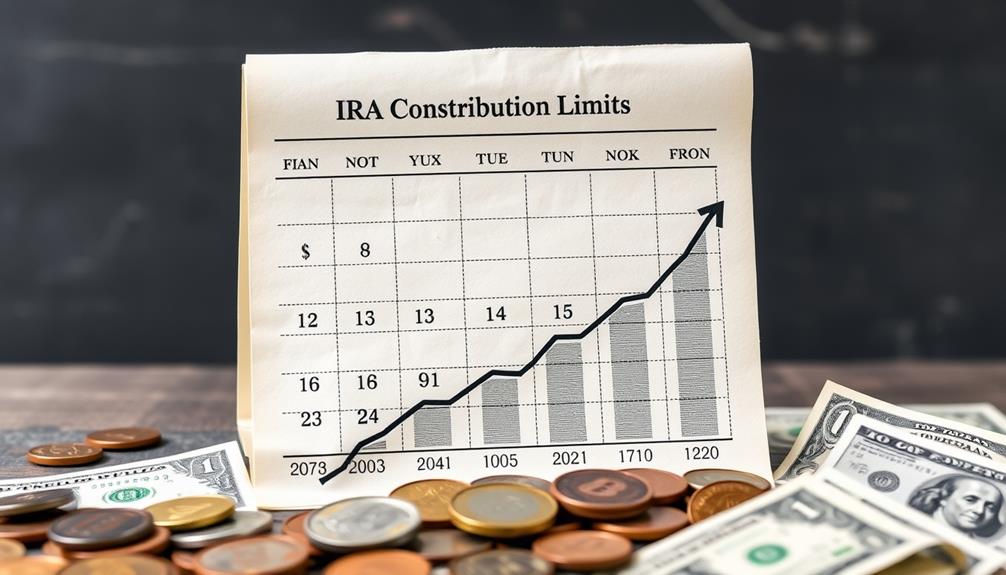In South Dakota, retirees like you can benefit from not having to pay state income tax on IRA withdrawals. This tax-free access to your retirement funds can significantly improve your financial security. It’s important to note that all forms of retirement income, such as Social Security and pensions, are also not taxed at the state level. However, federal taxes may still apply depending on your total income. Learning about effective withdrawal strategies can help you enhance your overall financial plan, and you can find more information on optimizing your retirement income here.
Key Takeaways
- South Dakota has no state income tax, meaning IRA withdrawals are not subject to state taxation, providing retirees with tax-free access to funds.
- All forms of retirement income, including pensions and Social Security, remain untaxed at the state level, maximizing savings for retirees.
- Federal taxes may still apply to IRA withdrawals, so retirees should consider timing their withdrawals strategically to minimize federal tax liabilities.
- Property taxes average 1.24%, which can affect retirees; however, there are exemptions and assistance programs available to alleviate this burden.
- Staying informed about potential future tax changes is crucial, as legislative discussions could impact retirees' financial planning in South Dakota.
Overview of South Dakota Taxes

When it comes to taxes, retirees in South Dakota find themselves in a favorable position. One of the biggest advantages is the absence of a state income tax. This means your IRA withdrawals, along with other forms of retirement income, won't be subject to state taxation. You get to keep the full amount of your distributions, which enhances your financial benefits considerably.
While South Dakota does have an average property tax rate of 1.24%, which is higher than the national average, it doesn't directly affect your IRA withdrawals. You'll want to factor this in when budgeting for your overall living expenses, however.
Additionally, the state has a low sales tax rate of 4.5%, offering further savings on day-to-day purchases.
Perhaps most appealing for retirees is that South Dakota imposes no estate or inheritance taxes. This provides additional financial relief, allowing you to pass on your IRA assets without incurring extra tax burdens.
IRA Withdrawals and State Tax

When you consider IRA withdrawals, understanding state tax benefits is essential for maximizing your retirement income.
In South Dakota, you won't pay state income tax on those withdrawals, which can greatly enhance your financial stability.
Let's explore effective withdrawal strategies that take advantage of this favorable tax environment.
State Tax Benefits
For retirees looking to optimize their financial strategy, understanding state tax benefits on IRA withdrawals can be a game changer. In South Dakota, you can enjoy significant advantages since IRA withdrawals are not subject to state income tax. This means that all your retirement income, including these withdrawals, remains untaxed at the state level.
Here's a quick look at the benefits:
| Feature | Details |
|---|---|
| State Income Tax | None on IRA withdrawals |
| Financial Well-Being | Enhanced by tax-free access |
| Tax-Friendly Policies | Attracts retirees |
With South Dakota's tax-friendly policies, you can manage your retirement income more effectively. While federal taxes may still apply to your IRA withdrawals, the absence of state income tax allows for better financial management. This favorable environment not only enhances your financial well-being but also makes South Dakota an appealing choice for retirees seeking to minimize their tax burden. Embracing these state tax benefits can truly boost your retirement experience.
Withdrawal Strategies Explained
Understanding state tax benefits sets the stage for effective withdrawal strategies from your IRA. In South Dakota, you enjoy a significant advantage: withdrawals from retirement accounts, including both traditional and Roth IRAs, aren't subject to state income tax.
This tax-friendly environment allows you to maximize your retirement income, as you can retain more of your funds for personal use.
When planning your IRA distributions, keep in mind that while state taxes are absent, federal taxes still apply. Consequently, it's crucial to strategize your withdrawals to minimize your overall tax burden. Consider timing your withdrawals to coincide with lower-income years, which can help reduce federal tax liabilities.
Additionally, many retirees in South Dakota find that their expenses can often be managed with just Social Security and tax-free IRA withdrawals. This means careful planning can enhance your financial benefits, allowing you to stretch your retirement savings further.
Always stay informed about how your withdrawal strategies affect your tax situation, ensuring you take full advantage of the favorable tax landscape South Dakota offers.
Social Security Income Tax Status

As of October 2023, South Dakota stands out for its favorable tax treatment of Social Security income, exempting it from state income tax entirely. This means you can keep your full Social Security benefits without worrying about state deductions.
In fact, the absence of state income tax allows all forms of retirement income—including pensions and retirement distributions—to remain untaxed at the state level.
With 41 states, including South Dakota, not taxing Social Security benefits, retirees find significant financial relief. While federal taxes may still apply to your Social Security income, the state's tax structure provides an excellent opportunity for tax relief.
This tax-friendly environment attracts many retirees looking to maximize their income during retirement.
Other Retirement Income Tax Status

While retirees often focus on Social Security benefits, it's vital to recognize that other retirement income, such as distributions from IRAs and 401(k)s, also plays an important role in your financial planning.
In South Dakota, you'll be pleased to know that all forms of retirement income, including pensions and IRA withdrawals, are exempt from state income tax. This tax-friendly environment allows you to maximize your savings and enjoy your retirement without worrying about state taxes eating into your distributions.
Moreover, since Social Security benefits are also not taxed at the state level, you can benefit from considerable tax relief altogether. The absence of state income tax means you'll receive your full retirement distributions without any deductions, which can greatly enhance your overall financial situation.
However, it's important to keep in mind that while South Dakota offers these advantages, you should still be aware of any federal tax obligations that may apply to your retirement income.
Staying informed will guarantee that your financial planning remains on track, allowing you to enjoy your retirement years to the fullest.
Property Tax Considerations

When planning your retirement budget, don't overlook property taxes, which in South Dakota average 1.24%.
Fortunately, there are tax assistance programs and exemptions available for low-income seniors that can help lighten that load.
Understanding these options can make a significant difference in managing your overall expenses as you settle into retirement.
Average Property Tax Rate
Understanding the average property tax rate is vital for anyone considering retirement in South Dakota. Currently, the average property tax rate in the state is 1.24%, which is slightly higher than the national average of 1.07%.
Although the median home value in South Dakota is approximately $187,800—significantly lower than the national median of around $281,900—property tax bills can still make a dent in your budget.
For retirees on fixed incomes, managing housing costs becomes essential as these taxes can impact your overall financial health. While South Dakota doesn't offer a broad state-level property tax exemption for all homeowners, there are specific exemptions available for qualifying low-income seniors.
These exemptions can help alleviate some of the financial burdens associated with property taxes.
When making retirement decisions, you'll want to factor in how these property tax rates affect your monthly expenses. By understanding the implications of property taxes, you can better plan your retirement budget and guarantee that your financial situation remains stable as you navigate your golden years in South Dakota.
Senior Tax Assistance Programs
Maneuvering the complexities of property taxes can be intimidating for seniors in South Dakota, but there are valuable assistance programs designed to ease this burden. These senior tax assistance programs can markedly reduce financial stress for low-income homeowners.
Here's a quick overview of key programs:
| Program Name | Description |
|---|---|
| Property Tax Exemptions | Reduces property tax burden for eligible seniors. |
| Property Tax Refund Program | Offers financial relief based on income and property taxes paid. |
| Property Tax Freeze Program | Locks in property taxes at the current level for financial stability. |
| Income Thresholds | Specific income requirements must be met for eligibility. |
To qualify for these programs, seniors need to meet specific income thresholds and age requirements established by the state. With an average property tax rate of 1.24%, these exemptions and programs provide essential support, ensuring that property taxes don't become an overwhelming burden. By taking advantage of these opportunities, you can better manage your finances and maintain stability in your golden years.
Property Tax Exemptions Available
Seniors in South Dakota have access to various property tax exemptions that can greatly ease their financial burden. With the average property tax rate at 1.24%, which is higher than the national average, these exemptions are essential.
Low-income seniors can take advantage of the property tax freeze program, which limits increases on their property taxes, providing significant relief. Veterans also benefit from specific property tax exemptions that can reduce or even eliminate their tax liabilities, making homeownership more affordable.
For seniors aged 65 and older, the property tax deferment program allows postponing payment on property taxes until the property is sold or the homeowner passes away, offering further financial flexibility.
These property tax exemptions and assistance programs are designed to support seniors and low-income families, ensuring that property taxes remain manageable in South Dakota. By understanding and utilizing these options, you can better navigate your financial landscape and maintain stability in your living situation.
If you think you might qualify for any of these programs, be sure to explore your eligibility to make the most of the available resources.
Homestead Exemption Program

For homeowners in South Dakota, the Homestead Exemption Program offers a valuable opportunity to reduce property tax burdens considerably. This program allows eligible homeowners to decrease the taxable value of their primary residence by up to $150,000, leading to significant tax reduction.
To qualify, you must meet specific income and residency requirements. Generally, you need to be age 65 or older, disabled, or a surviving spouse of a veteran. It's important to remember that this exemption only applies to your primary residence, excluding rental properties or secondary homes.
Here's a quick overview of the Homestead Exemption:
| Criteria | Details |
|---|---|
| Eligible Homeowners | Age 65+, disabled, or veteran spouses |
| Taxable Value Reduction | Up to $150,000 |
| Property Tax Rate | Average of 1.24% |
| Application Deadline | April 1st of the tax year |
| Primary Residence Only | Yes, no rental or secondary homes |
Sales Tax Implications

While maneuvering property tax benefits like the Homestead Exemption Program can provide significant savings, understanding sales tax implications is equally important for managing your finances in South Dakota. The state boasts a low sales tax rate of 4.5%, which is particularly beneficial for retirees purchasing goods and services. However, be aware that local jurisdictions can add additional sales taxes, raising the total to 6.5% in some areas.
One of the most favorable aspects for retirees in South Dakota is that essential items, such as food and prescription drugs, are exempt from sales tax. This exemption offers valuable financial relief, allowing you to allocate your budget more effectively.
Furthermore, the state's absence of state income tax means that when you make IRA withdrawals, you won't face additional taxes at the state level.
As a retiree, this overall tax structure supports a more favorable environment for managing a fixed income. By understanding these sales tax implications, you can better navigate your financial landscape and enjoy your retirement years with greater ease.
Future Tax Changes in South Dakota

As South Dakota continues to thrive without a state income tax, retirees benefit greatly from the current financial landscape, especially regarding IRA withdrawals. This tax-friendly environment has attracted many retirees, who enjoy the significant financial benefits of not facing state taxes on their retirement savings.
However, it's important to remain vigilant about potential future tax changes that could impact this favorable situation.
While there are no announced plans to introduce a state income tax that would affect IRA withdrawals, economic conditions can influence legislative decisions. Ongoing budget considerations may spark discussions about tax reforms during legislative sessions.
As a result, staying informed is vital for retirees. Any proposals regarding state income tax could directly affect your financial planning and the benefits you currently enjoy.
To prepare for any shifts in tax policy, keep an eye on local news and legislative updates. Engaging with local community discussions can also provide insights into the direction of tax reforms.
Frequently Asked Questions
Do You Pay State Income Tax on IRA Withdrawals?
You don't pay state income tax on IRA withdrawals if there's no state income tax in your area. This can give you more financial freedom, but remember to take into account any federal tax obligations that apply.
What States Require Tax Withholding on IRA Distributions?
In states where income tax looms like a shadow, withholding on IRA distributions is often mandatory. You'll find states like California and New York require it, while others might let you choose.
What Are the Tax Implications of Withdrawing From an Ira?
When you withdraw from an IRA, you'll face federal taxes based on your income bracket. While state taxes may not apply in some places, it's crucial to assess how withdrawals affect your overall tax situation.
Do You Pay State Taxes on 401K Withdrawals?
Like a bird soaring free, you won't pay state taxes on 401(k) withdrawals in South Dakota. This tax-friendly haven offers you the chance to enjoy your hard-earned savings without added state burdens.
Conclusion
In South Dakota, you might think your IRA withdrawals would hit you with a hefty tax bill, but surprise! They're tax-free at the state level. It's almost as if the state wants you to enjoy your hard-earned savings without a tax burden. And while you're at it, remember that Social Security and other retirement incomes get a friendly welcome too. So, relax—your golden years might just be as golden as they sound, minus the tax worries.









